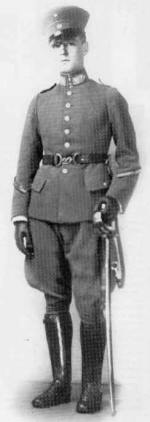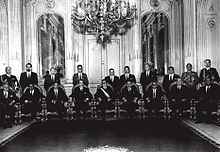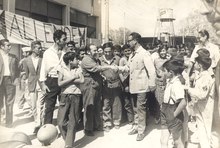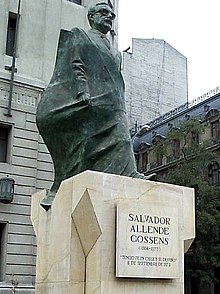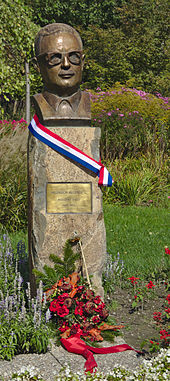Salvador Allende
Salvador Guillermo Allende Gossens [ salβaˈðoɾ ɣiˈjeɾmo aˈjende ˈɣosens ] (born June 26, 1908 in Valparaíso , † September 11, 1973 in Santiago de Chile ) was a Chilean doctor and politician. From 1970 to 1973 he was President of Chile . His presidency was an attempt to democratically establish a socialist society in Chile. Allende was a military coup in 1973 overthrew, during which he suicide committed.
Origin and education
Salvador Allende was born in 1908 to Salvador Allende Castro and Laura Gossens Uribe. According to his political companion Victor Pey, Salvador Allende's mother was Jewish . His family belonged to the upper middle class ; Political engagement and a progressive - liberal attitude were part of the family tradition. Allende's grandfather was a prominent doctor.
Allende went to school at the Liceo Eduardo de la Barra in Valparaíso. The Italian-born anarchist Juan De Marchi had a formative influence on him in his youth. Allende was active in sports and a member of the CD Everton de Viña del Mar sports club . He is said to have performed well in the long jump. After leaving school, he studied medicine at the Universidad de Chile in Santiago. In 1933 he completed his studies with a doctorate . In his dissertation Higiene Mental y Delincuencia ("Mental Hygiene and Delinquency ") he dealt critically with Cesare Lombroso . The Germanist and publicist Víctor Farías rates the dissertation as anti-Semitic. Farías' view is criticized, however, because Allende does not express his own assumptions in the relevant passages, but indirectly cites Lombroso. The same applies to Farías' view that Allende presented pathological behavior as innate in his dissertation. According to the Spanish lawyer Joan E. Garcés, there is also no evidence for Farías' claim that Allende later planned the introduction of a eugenics law as health minister. In his view that Allende's rejection of Walter Rauff's extradition from Chile was anti-Semitically motivated, Farías is also wrong because, as President, he only adhered to the existing legal situation, which he said in his response to the corresponding request from Simon Wiesenthal regretted.
Political career
First activities
Allende began to be politically active in the 1920s as a medical student at the Universidad de Chile. He took part in protests against the dictatorship of Colonel Carlos Ibáñez del Campo and was elected Vice President of the Federation of Chilean Students (FECH). In 1929 he joined both the Freemasons and the group " Avance " ("Forward"). In both organizations he made important contacts for his later political career.
After the suppression of an uprising led by Marmaduque Grove against the Ibáñez dictatorship, Allende was arrested but later released. Shortly afterwards he became secretary of the Socialist Party for the Valparaíso region, founded in 1933 .
Offices and Presidential Candidates
In 1937 he became a member of parliament for the Socialist Party for the first time . When the following year Frente Popular the radical Pedro Aguirre Cerda led to victory in the presidential elections, Allende came as Health Minister in the government. After only two years in office, he left the cabinet in 1940 . In 1945 he was surprisingly elected senator by the constituency of Valparaiso by a large margin.
In 1952 Allende was the first presidential candidate, but only finished fourth. In 1954 he held the office of Deputy Senate President. In 1958 he was again a presidential candidate of the left-wing alliance Frente de Acción Popular (FRAP), but was very narrowly defeated by the entrepreneur Jorge Alessandri Rodríguez, who was supported by the right-wing parties . In 1964 he ran again for president, but was clearly defeated by the Christian Democrat Eduardo Frei . The reason for this last election defeat was that the conservative parties supported the progressive Frei at the last minute.
In 1966, Allende was elected President of the Senate. In 1968 his resignation was called for when he placed the survivors of the guerrilla group around Che Guevara in Bolivia under his personal protection. In the same year, he denounced the Soviet invasion in Prague .
Election for President of Chile
In 1969 the Unidad Popular (UP) was founded as the successor to FRAP, an association of socialists, communists and some smaller left-wing parties. As their candidate, Allende won 36.3% of the vote in the presidential election on September 4, 1970 (less than 1964) and was just ahead of the conservative opponent Jorge Alessandri , who received 34.9% of the vote. Allende's lead was 39,000 votes, which was 7,000 votes larger than Alessandri's twelve years earlier. The third candidate, Radomiro Tomic of the Christian Democrats (PDC), received 27.9% of the vote. Since no candidate had won an absolute majority , the election of the Chilean president was up to parliament according to the constitution.
The parliamentary ballot took place on October 24, 1970. As it has a long tradition in Chile that the parliament votes for the candidate with a relative majority, Allende was elected president by the Chilean Congress after negotiations with the Christian Democrats, with 153 votes for Allende and 35 for Alessandri. The Commander in Chief of the Army , General René Schneider , was shot and seriously injured two days before the vote in a kidnapping attempt partly financed by the CIA . He died on October 25th, the day after the election. The general outrage over the attack on General Schneider was one of the reasons why the Christian Democrats decided to support Allende as the candidate with a relative majority. Criticism of the behavior of the Christian Democrats came from the German CDU , among others . The US ambassador called Allende's political opponents “stupid, badly organized and naive”.
Before Allende took office on November 3rd, he approved ten amendments to the constitution that the Christian Democrats had made a condition for their support in the parliamentary elections. In the time between election and inauguration, he survived an assassination attempt. By parts of the Chilean right, Allende's reign is commonly referred to as the dictatorship, an attribution that does not apply to the subsequent Pinochet government.
Presidency
Economic and social policy
The focus of Allende's economic policy was the nationalization of natural resources without compensation - above all the copper deposits - the expropriation of large foreign companies, the banks and an agrarian reform in which 20,000 km² of land was handed over from large landowners to farmers and collectives in a comparatively short time. The socialist government wanted to reduce Chile's economic dependence on foreign countries, especially the USA. In 1970 the coal mining and textile industries were nationalized. A year later, the shares in copper mining that were still in private ownership (mainly US) were expropriated with the consent of all parliamentary parties after Allende's predecessor Frei had already taken important steps in this direction.
The Unidad Popular set the prices for rent and for important basic necessities by the state. Education and health care were offered free of charge. Each child received shoes and half a liter of free milk a day. With his social policy, Allende followed both the socialist ideals of the 1970s and a South American tradition of “populist” demand politics. The policy of stimulating demand through government spending and expanding the money supply led to a surge in growth and rising real wages in the first year. In 1971 the gross domestic product grew by 9%.

The negative consequence of the new economic policy was the scarcity of some products, which led to an ever-growing black market . Most serious macroeconomically and politically was the rapidly rising inflation . While it was 29% the year before Allende took office, it rose to 160% in 1972. The increasing economic problems were related to the boycott of the economy of Chile by the USA and Western European countries, as well as the political erosion through large-scale subversive activities of the CIA, which pursued the FUBELT project of destabilizing the country and preparing a military coup and as a means of triggering it provided for an economic crisis. Private investment declined due to the increasing uncertainty. The government could no longer stimulate the economy even through the expansionary monetary policy. Instead, inflation reached over 600%, so that Chile finally got into a severe economic crisis.
Protests and radicalization
In 1971 the Christian Democrat and ex-minister Edmundo Pérez Zújovic was murdered; the act was attributed to the left-wing extremist group VOP (Vanguardia Organizada del Pueblo). The following year the Christian Democrats ended their support for Allende and joined the right-wing opposition.
Protests in the country swelled: farmers protested against the implementation of land distribution, which favored collectives over contract farmers; their occupation of agricultural land exacerbated the strained food supply. In 1972 food had to be rationed and the government was forced to use foreign currency to import food. In the autumn of 1972, sections of a number of professional groups, including many truck drivers, bank employees, workers and students, went on strike to force a change in economic policy. There were street battles. Allende declared a state of emergency. Radical right-wing groups responded with terror and sabotage . During Allende's tenure there were a total of six hundred terrorist attacks on railways, bridges, power lines and pipelines. A 30-day visit from Fidel Castro , who expressed his skepticism about Allende's model and the need for armed struggle across the country, exacerbated the situation. He angered the middle class of society and fueled extremists on both sides.
The involvement of the military in the government in November 1972 through the appointment of General Carlos Prats as Minister of the Interior calmed the tense situation for a few months and parliamentary elections could be held in early 1973. In these elections, the UP increased its share of the vote to 44%. However, it failed to achieve the desired majority. At the same time, right-wing parties also received more votes. However, even with the votes of the Christian Democrats, they were not enough to remove Allende from office with the two-thirds majority required for this. When new strikes by truck drivers and students broke out in July 1973 with the support of large circles of the conservative opposition, the political situation steadily escalated. Allende appointed other high-ranking officers to his cabinet - but political sentiment within the military had turned. On June 29, 1973, a first attempted coup by a tank regiment was bloodlessly suppressed by military officials loyal to the government. On August 22, 1973, Congress made a symbolic gesture (the Constitution did not provide this option) to Allende's distrust . General Carlos Prats, who was able to end the attempted coup in Santiago without bloodshed on June 29, resigned. He was succeeded by his previous deputy General Augusto Pinochet . At that time, the largest rallies ever held in Chile took place in Santiago, with over 700,000 people demonstrating, sometimes for the government and sometimes for the opposition. According to witness statements, Allende wanted to declare himself ready in the course of September 11, 1973, to decide the messy situation democratically by means of a plebiscite about his remaining in office. This decision could no longer be published because the military put on a coup at dawn that day. Some historians and politicians doubt that Allende was planning a plebiscite.
The coup
On September 11, 1973, at 6:20 a.m., President Salvador Allende was informed by telephone that the fleet in Valparaíso , the largest port city in Chile, had risen against him and was demanding his resignation. Allende immediately tried to reach the commander in chief of the armed forces, General Augusto Pinochet , but he did not answer. Allende went to the Moneda Presidential Palace with his cabinet and some friends and family . Among his companions were two of his daughters, his doctor, the President's bodyguard and his long-time lover. Defense Minister Orlando Letelier was absent as he had already been arrested by the coup plotters.
At 8 a.m., a statement by the putschists, who described themselves as the military government, was read out on the radio. Only here did General Pinochet identify himself as a coupist. Shortly afterwards, Allende received a call from the putschists. They asked for his resignation and in return offered to fly him out of the country with his family immediately. He resolutely refused. At 9:30 a.m., the putschists threatened to bomb the Moneda. Allende asked the palace guards and all unarmed persons to leave the building. He himself stayed behind with a few loyal followers and prepared for the coming battle.
At 11:55 a.m., the Air Force began bombing the Presidential Palace with two aircraft. Government-friendly radio stations and some quarters of the capital, where the majority of activists and sympathizers of the Unidad Popular lived, are said to have been bombed. Augusto Olivares ("El Perro"), the well-known journalist and director of the Canal 7 television station, committed suicide with an assault rifle on the first floor of the Moneda. This made one of the president's closest friends the first victim of the coup, whereupon Allende ordered a minute's silence for him in the midst of the chaos.
Direct circumstances of death
At around 2 p.m., the army began to storm the palace. After a brief skirmish, Allende ordered the surrender. Only he remained in the "Hall of independence" back and committed there suicide . His suicide was witnessed by his doctors Patricio Guijón and José Quiroga, who observed the suicide. In addition to the two surviving doctors, five other people close to Allende witnessed his suicide:
- Arsenio Poupin Oissel - cabinet member, murdered a few days later
- Enrique Huerta Corvalán - administrative director of Moneda, murdered a few days later
- David Garrido - Security Guard, Survivor
- Ricardo Pincheira - security guard, survivor
- Pablo Manuel Zepeda Camillieri - member of the President's Guard, survivor
Even so, some supporters believed Allende was shot by intruding soldiers who then staged a suicide. In 1990, after the end of the military dictatorship, the president's suicide was confirmed by another autopsy, the results of which are in accordance with the statements of the eyewitnesses and the police investigation report. His relatives (wife, daughter) confirmed this process.
Nonetheless, doubts have repeatedly been expressed about the circumstances of his death, which led to the exhumation of Allende's remains on May 23, 2011 in order to finally clarify the cause of his death. In mid-July 2011, the Chilean forensic medicine agency announced that Allende had shot himself with a Kalashnikov in the course of the violent coup . The weapon was set to continuous fire , which is why a total of two shots were fired. According to the results of the international team of experts, there is no evidence that a second person was involved in his death. This confirmed the statements of the eyewitnesses again.
Role of the USA
After Pinochet seized power, US Secretary of State Henry Kissinger said that the United States "didn't do it" (regarding the coup itself) but that it "created the greatest possible conditions." Documents published around the turn of the century show that the US government and the CIA sought to overthrow Allende in 1970 ( Project FUBELT ). A direct participation in the coup of 1973 could not be proven by the government documents published so far. In the period before the coup, the US massively increased its military aid to Chile. However, many relevant documents are still confidential.
The CIA informed the Federal Intelligence Service of the planned coup a few days before the coup. The Federal Intelligence Service is said to have failed to inform the then Federal Chancellor Willy Brandt . The information reached the GDR via Alfred Spuhler , a Stasi spy in the BND . However, a warning to Allende from East Berlin came too late.
family
In the 17th century, the Allendes came to Chile from the Basque Country, and from the first half of the 19th century they stood out among other aristocratic families. The most outstanding family member (before Salvador Allende) was his grandfather Ramón Allende Padín , "The Red", a member of the Partido Radical Social Demócrata (PRSD) and Grand Master of the Freemasons . His son (Salvador Allende's father) was also "radical" and a Freemason. He worked as a public official and as a notary for the port of Valparaíso. He gained notoriety for his ingenuity, his poetic talent (just like his father) and his fanatical attitude towards the Chileanization of Tacna and Arica . He married the daughter of a Belgian immigrant, Laura Gossens, a woman of great beauty and profound religiosity. They had six children, initially Alfredo, Inés, Salvador and Laura. After the early deaths of Laura and Salvador, they had two more children, whom they gave the same names. This Salvador is the ex-president of Chile.
In 1940 Salvador Allende married Hortensia Bussi (1914–2009), called "La Tencha", who came from a middle-class family . He had three daughters with her: Carmen Paz (* 1941), Beatriz (* 1943; † 1977 by suicide) and Isabel Allende , who was a member of the Chilean lower house ( parliamentary chamber ) from 1994 to 2010 , a senator since 2010 and chairwoman of the Socialist Party is. She has the same name as the world-famous writer Isabel Allende , daughter of Salvador Allende's cousin, who always called him “uncle”. Another well-known relative of Salvador Allende is his nephew Pascal Allende , who co-founded the left-wing organization Movimiento de Izquierda Revolucionaria (MIR) in 1965 and led it during the underground military dictatorship.
Miria Contreras (called "La Payita"), his girlfriend and private secretary, had accompanied him to the government building on the day of the coup. On Allende's orders, she left La Moneda in time, had to go into exile , later returned to Chile and died of cancer on November 22, 2002.
Posthumous honors
After the end of the military dictatorship in Chile, Allende's body was transferred from Valparaíso , where he had been buried in camera after the coup, to Santiago de Chile and buried there in the general cemetery. Several hundred thousand people attended the funeral. A statue of Allende is now located next to the La Moneda presidential palace .
After his death, Salvador Allende was honored primarily in the socialist countries of Europe. In Berlin ( Köpenick district ), the Salvador-Allende quarter was named after him, which still bears this name today. In the university and Hanseatic city of Greifswald , the BBS of the VEK "Engineer, Civil and Transport Construction Combine Rostock" in the GDR was named Dr. Salvador Allende . There was an "Allende memorial stone" in the schoolyard. This educational institution was closed after the fall of the Wall and a hotel was built on the property. Two of the former buildings were converted into student dormitories and props stores for the theater in front of which the memorial stone is still located today. In Jena there is a square in the Lobeda-Ost district and streets in Bautzen , Chemnitz , Ludwigsfelde , Neubrandenburg and Weimar are named after Salvador Allende. In 1973, in Bernburg (Saale) in Saxony-Anhalt , the then new residential area on Kirschberg was named Dr.-Salvador-Allende-Siedlung and a memorial plaque was placed on the corner of Dr.-John-Rittmeister-Strasse, which in 2007 was "indefinitely ...] was stored ". Today's secondary school in Klötze (Saxony-Anhalt) bears the name “Dr. Salvador Allende ”, as well as elementary schools in Rheinsberg ( Brandenburg ) and Chemnitz.
In 1983 the former Bornplatz in the Hanseatic City of Hamburg was renamed Allende-Platz in honor of the Chilean President. It is located next to the grounds of the University of Hamburg in the immediate vicinity of the former Talmud Tora School . In Oer-Erkenschwick , the Socialist Youth of Germany - Die Falken - has been calling their educational establishment Salvador-Allende-Haus since it opened in the late 1970s. There is also Salvador-Allende-Strasse in Bremen and Frankfurt am Main . In the Elbe town of Wittenberge (Brandenburg) there is also a street (Dr.-Salvador-Allende-Straße) and a district (Allendeviertel) with his name.
Movie
- Patricio Guzmán : Salvador Allende . Documentation, France / Chile, 2004, 100 min.
See also
- History of Chile
- Venceremos , a battle song from Salvador Allende's election campaign
literature
- Salvador Allende: Chile - popular struggle against reaction and imperialism. From speeches by the President of the Republic of Chile Salvador Allende Gossens. State Publishing House of the GDR, Berlin 1973.
- Klaus Eßer: Through free elections to socialism or Chile's way out of poverty. Rowohlt, Reinbek near Hamburg 1972, ISBN 3-499-11554-9 .
- Willi Baer , Karl-Heinz Dellwo (ed.): Salvador Allende and the Unidad Popular. Laika, Hamburg 2013, ISBN 978-3-942281-64-5 .
- Fernando D. Garcia: Salvador Allende. The end of an era. Structure, Berlin 1998, ISBN 3-351-02483-5 .
- Waltraud Hagen, Peter Jacobs: Salvador Allende: A Chronicle. New Life, Berlin 2008, ISBN 978-3-355-01749-7 .
- Wim Reckman: Allende, Chile's new man. Laetare, Freiburg im Üechtland / Imba, Stein 1971, ISBN 3-7839-0026-3 .
- Osvaldo Puccio: A quarter of a century with Allende. Memories of his private secretary. Translated by Joachim Stennert. Verlag der Nation, Berlin 1980; Pahl-Rugenstein, Cologne 1981, ISBN 3-7609-0589-7 .
- Günther Wessel : The Allendes: With ardent patience for a better world. Campus, Frankfurt 2002, ISBN 3-593-36775-0 .
- Johnny Norden: The doctor of the "Rotos". , New Germany , June 26, 2008.
- Fidel Castro : The Battle and Death of President Salvador Allende, in For a Better Republic. A reader. Series: Small Library Politics and Contemporary History, 480. Pahl-Rugenstein, Cologne 1987, essay 93.
Comic
- Carlos Reyes, Rodrigo Elgueta: The Allende Years. Bahoe Books , Vienna 2020. (from the Chilean Spanish by Lea Hübner.)
Web links
- Literature by and about Salvador Allende in the catalog of the German National Library
- Photo of Salvador Allende on September 11, 1973 - the "World Press Photo" of 1974
- Salvador Allende Gossens in the Munzinger archive ( beginning of article freely available)
Individual evidence
- ^ Munzinger-Archiv GmbH, Ravensburg: Salvador Allende Gossens - Munzinger Biographie. Retrieved February 12, 2017 .
- ↑ Wolfgang U. Eckart , Christoph Gradmann (Ed.): Doctors' Lexicon. From antiquity to the present . 3. Edition. Springer, Heidelberg 2006, ISBN 3-540-29584-4 , pp. 8 .
- ↑ Salvador Allende committed suicide . Spiegel Online , July 20, 2011.
- ^ A b Jens Glüsing , Christian Habbe: Vergilbt und zerfleddert , Spiegel Online , May 14, 2005.
- ↑ a b c d Hugo Velarde: Heil Allende! , Friday .
- ^ R. Minder: Freemason Politicians Lexicon: from Salvador Allende to Saad Zaghlul Pascha. Studies Verlag, May 5, 2004, ISBN 978-3-7065-1909-0 .
- ^ I. Emmerling: The GDR and Chile (1960-1989): Foreign policy, foreign trade and solidarity. Ch. Links Verlag, February 2013, ISBN 978-3-86153-725-0 , p. 47.
- ↑ Georg Schendl: The Pinochet case - Chile 1973. On the practice and theory of human rights. (PDF; 661 kB) Diploma thesis, University of Vienna 2008.
- ↑ Patricia Verdugo: Allende. Cómo la Casa Blanca provocó su muerte. Santiago 2003.
- ↑ Loreto Galindo Sazo: The cooperation between CDU and PDC during the time of the Chilean military dictatorship 1973–1989 . In: Historical and Political messages, Archive for Christian Democratic Policy , Issue 21/2014 ( Konrad Adenauer Foundation ), pp 183-213, kas.de (PDF). Quote p. 188: "The fact that the PDC had supported Allende was very much criticized within the CDU, even at later times."
- ↑ Felipe Larraín, Patricio Meller: The Socialist-Populist Chilean Experience, 1970–1973. In: Rudiger Dornbusch, Sebastian Edwards: The Macroeconomics of Populism in Latin America. 1991, core.ac.uk (PDF).
- ↑ cgu.edu ( Memento of the original from May 28, 2010 in the Internet Archive ) Info: The archive link was inserted automatically and has not yet been checked. Please check the original and archive link according to the instructions and then remove this notice. (PDF, p. 37 f.)
- ↑ United Nations Statistical Database : Estimates of Rates of Growth of GDP (in Percent)
- ↑ Chilean Central Bank ( Memento of March 12, 2007 in the Internet Archive )
- ↑ Jussi M. Hanhimaki: The Flawed Architect: Henry Kissinger and American Foreign Policy: Henry Kissinger and American Foreign Policy. 2004, Oxford University Press, ISBN 0-19-534674-2 , p. 103.
- ↑ Pérez Zújovic was the interior minister of Eduardo Frei Montalva when several people died in the repression of a land occupation in Puerto Montt. Víctor Jara made him known with his song Preguntas por Puerto Montt.
- ^ William F. Sater: Chile and the United States. Empires in Conflict. University of Georgia Press, Athens 1990, ISBN 0-8203-1249-5 , pp. 178-181.
- ↑ Patricio Aylwin said in an interview that it is still disputed whether this was Allende's intention: “Briones nos dijo que Allende buscaría una formula de salida, que una de ésas sería el plebiscito. Pero no hay ninguna prueba. Allende debió pronunciar su discurso el lunes 10 de septiembre y decidió dejarlo para un acto en la Universidad Técnica el martes en la mañana, pero ese martes se produjo el golpe. No sé si tenía un discurso redactado. Hasta el día de hoy no se ha conocido. ”In: El Mercurio . December 24, 2006 ( diario.elmercurio.com ( Memento from January 1, 2007 in the Internet Archive ))
- ^ William F. Sater: Chile and the United States. Empires in Conflict. Athens / London 1990, p. 181.
- ↑ a b Mirjam Gehrke: Chile wants to clear up death of Allende . Deutsche Welle, January 30, 2011, accessed January 31, 2011
- ↑ Hermes H. Benitez: Las muertes de Salvador Allende: una investigacion critica de las principales versiones de sus ultimos momentos. RIL editores, Santiago 2006, ISBN 956-284-497-8 .
- ^ Justice investigates Allende's death. In FAZ , January 31, 2011, p. 5
- ↑ Süddeutsche Zeitung No. 119/2011 of May 24, 2011, p. 8 ( Chile: Autopsy report Salvador Allende: Suicide in the palace ).
- ^ Chile: Scientific autopsy confirms Allende suicide . In: US-Today , July 19, 2011, accessed July 20, 2011.
- ^ Salvador Allende committed suicide according to the autopsy . welt.de, July 19, 2011 (accessed July 20, 2011).
- ↑ Peter Kornbluh: The Kissinger Telcons: Kissinger Telcons on Chile. National Security Archive Electronic Briefing Book No. May 12, 2004 ( gwu.edu )
- ↑ Peter Müller, Michael Mueller, Erich Schmidt-Eenboom : Against friend and enemy. The BND: Secret Politics and Dirty Business. Reinbek, Rowohlt 2002, ISBN 3-498-04481-8 .
- ↑ Interview with Pascal Allende in: Gaby Weber: Die Guerilla takes stock. Talks with guerrilla leaders in Argentina, Bolivia, Chile and Uruguay. Giessen 1989, p. 192.
- ↑ The memorial plaque remains in storage for the time being. In: Mitteldeutsche Zeitung . November 16, 2007 (accessed September 12, 2015)
- ↑ Secondary School "Dr. Salvador Allende ”. Retrieved November 9, 2015.
- ↑ Grundschule-rheinsberg.de. Retrieved June 1, 2018 .
- ^ Home page of the Dr. Salvador Allende Primary School. Retrieved December 13, 2018 .
| personal data | |
|---|---|
| SURNAME | Allende, Salvador |
| ALTERNATIVE NAMES | Allende Gossens, Salvador |
| SHORT DESCRIPTION | Chilean doctor and president |
| DATE OF BIRTH | June 26, 1908 |
| PLACE OF BIRTH | Valparaíso |
| DATE OF DEATH | September 11, 1973 |
| Place of death | Santiago de Chile |


